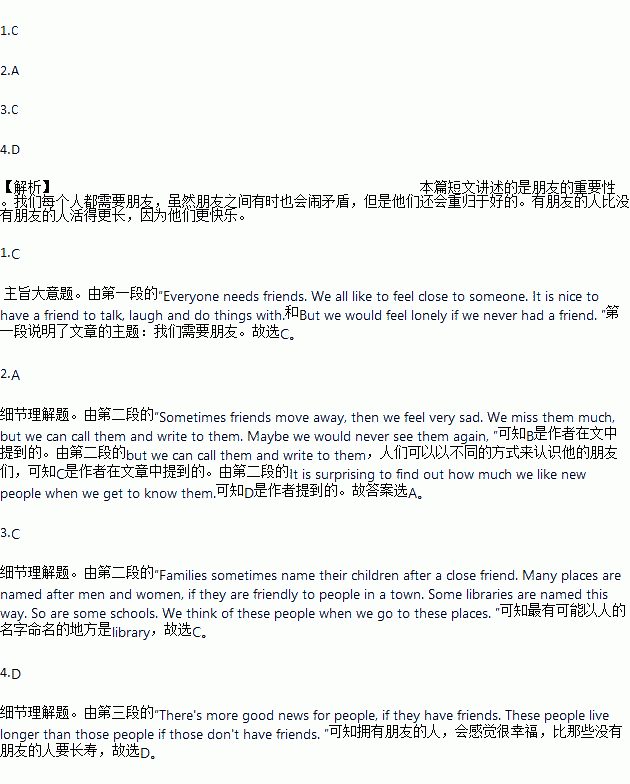题目内容
Everyone needs friends. We all like to feel close to someone. It is nice to have a friend to talk, laugh and do things with. Surely, there are times when we need to be alone. We don't always want people around. But we would feel lonely if we never had a friend.
No two people are the same. Sometimes friends don't get along well, which doesn't mean that they no longer like each other. Most of the time they will go on being friends. Sometimes friends move away, then we feel very sad. We miss them much, but we can call them and write to them. Maybe we would never see them again, and we can make new friends. It is surprising to find out how much we like new people when we get to know them. Families sometimes name their children after a close friend. Many places are named after men and women, if they are friendly to people in a town. Some libraries are named this way. So are some schools. We think of these people when we go to these places.
There's more good news for people, if they have friends. These people live longer than those people if those don't have friends. Why? It could be that they are happier. Being happy helps you stay well. Or it could be just knowing that someone cares, if someone cares about you, you take better care of yourself.
1.The first paragraph tells us __________.
A. none needs friends
B. we always need friends around us
C. making friends is the need in people's life
D. we need to be alone
2.Which of the following is what the writer doesn't say in the passage?
A. People are happy when their friends leav e them.
e them.
B. People may never see their friends after their friends move away.
C. People can know their friends in different ways.
D. People like their friends very much if they get to know them.
3.Which of the following is the most probable place people name after friendly people?
A. A house. B. A room.
C. A library. D. A village.
4.If people have friends, they would live longer, because __________.
A. they feel happier and healthier B. they get a lot of help from their friends
C. they take better care of themselves D. both A and C
If you can find a tree which has been cut down,you will see many rings,or circles,on the base of the trunk.By learning to read these rings,you can find out about the tree's life.
The number of rings tells you how old the tree is.Each year,new wood is formed on the outside of the tree.This new wood is light in color when the tree is growing in spring and summer,and dark in winter when the tree is not growing much.So,if you count the rings of dark?or?light colored wood,you can often find out how old the tree is.
You can also tell which years have been good years and which years have been bad years.When the light?colored rings are very wide,it means that the tree has been growing quickly that year.If the rings are narrow,it has been growing slowly.If the rings on a tree trunk were greatly magnified,you would be able to see why the rings are light?colored when the tree is growing quickly and dark?colored when the tree is growing slowly.The tree trunk is made up of microscopic tubes,like some pipes,carrying water from the soil,through the trunk,and up to the leaves.They are wide and thin?walled when the tree is growing quickly and they are carrying a lot of water.They are narrow and stuck together when the tree is not growing so quickly.
When a tree is old,the tubes in the centre of the tree don't carry water.The walls of the tubes have become thick with materials which have stuck along them over the years,forming a kind of wood called“heartwood”.This kind of wood is darker in color than the young,growing wood on the outside of the tree.
You don't very often see whole tree trunks which have been cut across.But once you learn to read a cross section of the wood,you can see much more in wood which has been used to make boxes,houses and other things.
In most wood,instead of seeing the trunk cut across,you are seeing it cut along its length.Because you don't see the whole tree,you can't tell how old it is.
Title:1.of a Tree
General information | Old trees | ||
Items | Facts | Items | Facts |
Where can rings be seen | On the 2.of a trunk | The tubes in the centre of the tree | Don't carry water |
The3.of rings | Helps us know about its age | The walls of the tubes | Become 4.; Form 5. |
6.light?colored rings | Show the tree grows quickly | ||
Narrow7. rings | Mean the tree grows slowly | ||
Microscopic tubes | Function | Carry8. | |
Features | Wide and 9.when growing quickly | ||
Narrow and stuck together when growing 10. | |||


 now what I mean.
now what I mean.